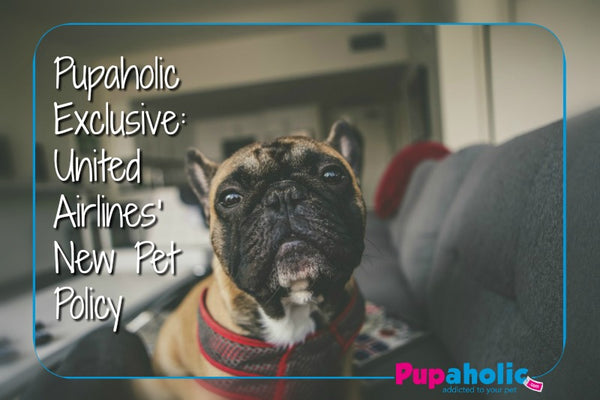Blog

Pupaholic Exclusive: United Airlines' New Pet Policy
How Will This Change Your Flight?
Are you concerned about your pet's safety when flying? For years, animal activists have been calling for an updated policy when it comes to animals on airlines. This month, United Airlines has updated their pet policy, including all new breed restrictions. While the news comes as a relief for pet owners, it also means a whole new set of rules for those who fly with their pet regularly. Before these changes take effect in the summer of 2018, take a look at some of the new restrictions included in PetSafe.
Why Change the Old Policy?
Animal rights activists have been calling for a change in policy from airlines for years. In particular, we've seen two high-profile stories which have finally forced United to change their policy. March saw two stories of animal cruelty come to life from the airline: One, a dog died while on a flight, and the other, two dogs which were sent to incorrect destinations. On a flight from Houston to LaGuardia, a passenger had brought their dog on the flight, attempting to store the dog beneath their seat, as most do. The flight attendant would then approach the passenger, forcing them to place the dog in the overhead storage bin instead, resulting in the dog's death part way through the flight. In the case of the misplaced dogs, the mix-up was due to a carrier. A German Sheppard who was meant to fly from Japan to Kansas, the dog was confused with a Great Dane flying from Kansas to Japan. The crew had mixed up the two dog's destinations, resulting in a dangerous and stressful trip for the animals as well as a nightmare for their respective owners.
Making sure your pet is microchipped and equipped with up-to-date ID tags will help prevent potential mix-ups.
New Policy
The new policy, which will be taking effect June 18, 2018, includes a handful of new restrictions designed to ensure pet safety. For starters, it's important to note that only cats and dogs will not be allowed in cargo. As dictated by PetSafe -- the name of the new policy -- there will be certain restrictions on the type of cats and dogs which are allowed in cargo, mostly due to the increased health risks associated with these breeds. In general, the ban affects short-nose breeds as well as strong-jawed dogs; however, it's not clear how this will affect service animals. For those hoping to travel with a short-nosed breed, it's important to mention that some of these will be allowed within the cabin -- as long as they fit size restrictions and can be safely be kept under your seat.
Restrictions
While the new regulations and restrictions can be found on the new PetSafe website, we've gathered some of the important points for you here. To start, pets will no longer be allowed in cargo if you're traveling to or from Palm Springs, Las Vegas, Phoenix, or Tucson between the months of May and September. United, states this is due to the extreme heat conditions of these locations. In addition, there are further limitations on how many connecting flights your animals can be brought on, which can be confirmed when you book your flight the mandatory five days in advance. There are also a variety of countries which will now require you to use an International Pet and Animal Transportation Association company, and crates over 30" in height will no longer be accepted. In terms of animals which are now on the restricted list, check out this excerpt from the PetSafe website:Dogs: Shar-Pei, Mastiffs, Pugs, Chow Chow, Bulldogs, Boxers, and at least a dozen others.
Cats: Burmese, Himalayan, Persian, Exotic Shorthair.
While it may seem like a hassle to have so many new hoops to jump through, especially for those who regularly bring their pets on trips, the new regulations have largely been put in place to ensure the safety of everyone traveling. Be sure to confirm all details before flying with your animals, as there may be additional requirements you'll have to meet, and remember to try to keep your pet as comfortable as possible on their trip. While these may feel like a bit of a hassle, your pet's safety should always come first.

